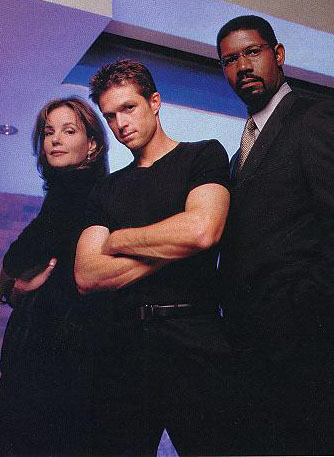Entertainment
Weekly - Television
by Ken
Tucker
'Now'
Hear This
Moonlighting
creator Glenn Gordon Caron grabs our attention with the
genre-busting brain-transplant drama Now and Again
 Watching
the new series Now and Again, you realize how little
pure playfulness there is in prime-time programming. I'm not
talking about the relentless joke making that goes on in sitcoms
good and bad; I mean the sort of light, airy humor that we most
often used to get from movies (in nearly any Cary Grant film, for
example, or in the chatty flights of fancy of Preston Sturges'
comedies).
Watching
the new series Now and Again, you realize how little
pure playfulness there is in prime-time programming. I'm not
talking about the relentless joke making that goes on in sitcoms
good and bad; I mean the sort of light, airy humor that we most
often used to get from movies (in nearly any Cary Grant film, for
example, or in the chatty flights of fancy of Preston Sturges'
comedies).
Now and Again -- starring Eric
Close as a human brain encased in a ripped bod created by our
government -- toys with and confounds its audience's expectations
in a way that no other TV show has since Ally McBeal in
its first season, and does so With considerably more grace. That Now
and Again -- not to be confused with ABCs entrancing
divorcee divertissement Once and Again -- comes from
producer-writer Glenn Gordon Caron only adds to the
unexpectedness of this new show's artfulness. Caron was the
creator of Moonlighting, the 1985-89 show that started
off cleverly, then slowly but steadily turned Bruce Willis and
Cybill Shepherd into annoying dingbats to be avoided.
If you watched Now and Again's
pilot, you know that a weary, rniddle-aged insurance salesman,
played to portly perfection by John Goodman, was accidentally
rammed by a New York City subway car. When, a few seconds later,
we were meant to believe that Goodman's jowly, lovable Michael
Wiseman had been replaced by Close's pretty-boy Wiseman, you
probably shouted at the screen the same thing I did: "I want
my John Goodman back!" But Caron's nervy and frustrating
opening soon began to pay off.
While not an actor in possession of the
presence or audience goodwill that Goodman has, Close is no bland
robot; he quickly establishes his own wry, quizzical personality.
His mind transplanted into a superior human container, Wiseman is
faced with a classic dilemma: He can remain alive -- to use his
superhumanly strong body to defeat threats to national security
-- but he must never reveal to his wife and daughter the person
he has become. If he spills the beans, our government will spill
his and his family's-blood.
Thus, Wiseman, unrecognizable to his
family, stands in the shadows and looks longingly at Margaret
Colin (and who wouldn't?). Playing his wife, Lisa, Colin is a bit
tremulous and tentative, just as a grieving widow might be. CBS
has been trying to turn Colin into a TV star for years, but until
now the net has channeled her tart intelligence and wide-eyed
beauty into characters on lawyer-themed clunkers like The
Wright Verdicts, Legwork, and Foley Square,
and into a nothing role in Chicago Hope. In Now and
Again she's finally free to be complicated: vulnerable,
angry, and perplexed by her husband's death, yet resourceful and
strong, providing support for daughter Heather, played with a
refreshing lack of smart-aleckiness by Welcome to the
Dollhouse's Heather Matarazzo.
Two other characters help give Now
its zing. Gerrit Graham's Roger Bender was Wiseman's
insurance-company colleague and best buddy, despite the fact that
he's a corporate weasel whose lack of scruples extends even to
cheating Lisa out of a decent death settlement when the John
Goodman-Wiseman dies. But it's a measure of how deft Caron's
writing is that we come to see that Roger is less venal than
hapless, and he soon becomes a sympathetic comic foil who stays
involved in the Wisemans'lives. Just as good is Dennis Haysbert
as the Eric CloseWiseman's government-appointed  overseer, Dr. Theodore Morris. Required to
frequently be cold and imperious -- "You are an
experiment," he informs Wiseman, "and I will tell you
when and what you will do" -- Haysbert also conveys the
enthusiastic curiosity that's the flip side of scientific
concentration. He likes to test his Three Billion Dollar Man (the
late-20th-century price tag for building a better Lee Majors) by
daring him to try to outrun and outwit his government handlers;
it amuses Dr. Morris to see how clever his "science
experiment" can be.
overseer, Dr. Theodore Morris. Required to
frequently be cold and imperious -- "You are an
experiment," he informs Wiseman, "and I will tell you
when and what you will do" -- Haysbert also conveys the
enthusiastic curiosity that's the flip side of scientific
concentration. He likes to test his Three Billion Dollar Man (the
late-20th-century price tag for building a better Lee Majors) by
daring him to try to outrun and outwit his government handlers;
it amuses Dr. Morris to see how clever his "science
experiment" can be.
The series' first story line -- about an
elderly Japanese man intent on blackmailing the government by
threatening to nerve-gas Manhattan -- was at once suspenseful and
whimsical. This doddering terrorist transported the deadly gas
inside ordinary eggs, Caron's symbol for the fragility of life.
By cutting back and forth between the terrorist's awful
preliminary attacks (releasing just enough gas to leave everyone
in a subway car writhing, dying with blood pouring from their
mouths) and Wiseman's wistful, illicit, attempts to contact his
family, Now and Again managed to avoid both hyped-up
melodrama and wet sentimentality.
Caron is a master of juxtaposition, and
not just in matters of plot points. In interviews, he claims he
thieved the show's basic premise from the musical Damn
Yankees, and episodes frequently use show tunes such as West
Side Story's "Something's Corning" as ironic mood
music.
Although there's always the chance that
Close and Colin could become as peevishly insufferable as the
squabbling couple on Moonlighting did, right now the
playful atmosphere of Now and Again provides a blissful
kick unlike anything else in prime time.
Grade: A
October 29, 1999
 Watching
the new series Now and Again, you realize how little
pure playfulness there is in prime-time programming. I'm not
talking about the relentless joke making that goes on in sitcoms
good and bad; I mean the sort of light, airy humor that we most
often used to get from movies (in nearly any Cary Grant film, for
example, or in the chatty flights of fancy of Preston Sturges'
comedies).
Watching
the new series Now and Again, you realize how little
pure playfulness there is in prime-time programming. I'm not
talking about the relentless joke making that goes on in sitcoms
good and bad; I mean the sort of light, airy humor that we most
often used to get from movies (in nearly any Cary Grant film, for
example, or in the chatty flights of fancy of Preston Sturges'
comedies).  overseer, Dr. Theodore Morris. Required to
frequently be cold and imperious -- "You are an
experiment," he informs Wiseman, "and I will tell you
when and what you will do" -- Haysbert also conveys the
enthusiastic curiosity that's the flip side of scientific
concentration. He likes to test his Three Billion Dollar Man (the
late-20th-century price tag for building a better Lee Majors) by
daring him to try to outrun and outwit his government handlers;
it amuses Dr. Morris to see how clever his "science
experiment" can be.
overseer, Dr. Theodore Morris. Required to
frequently be cold and imperious -- "You are an
experiment," he informs Wiseman, "and I will tell you
when and what you will do" -- Haysbert also conveys the
enthusiastic curiosity that's the flip side of scientific
concentration. He likes to test his Three Billion Dollar Man (the
late-20th-century price tag for building a better Lee Majors) by
daring him to try to outrun and outwit his government handlers;
it amuses Dr. Morris to see how clever his "science
experiment" can be.